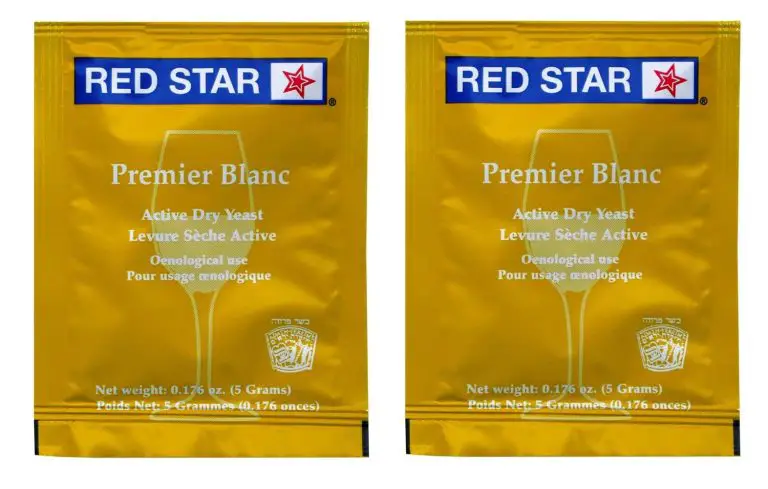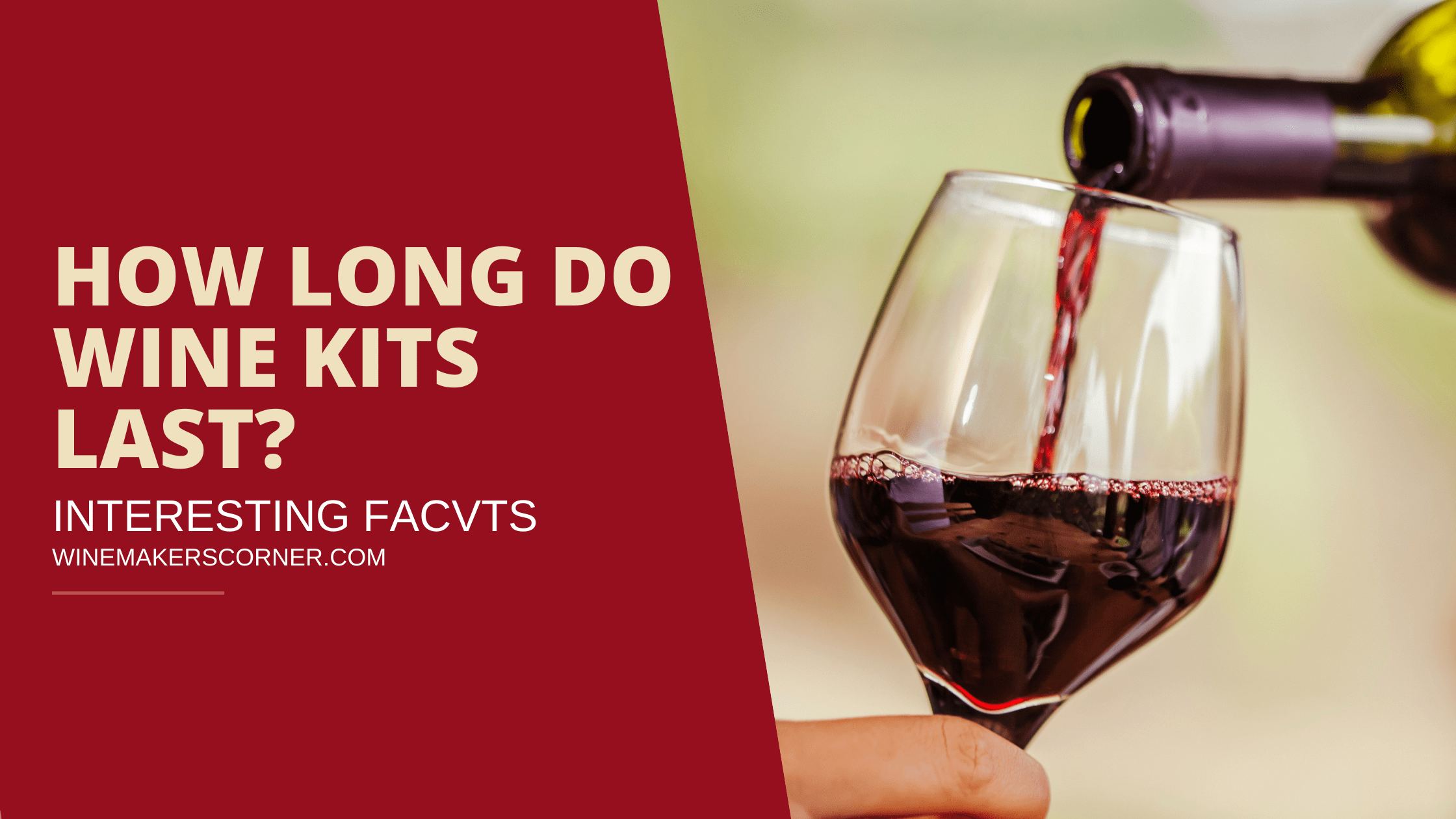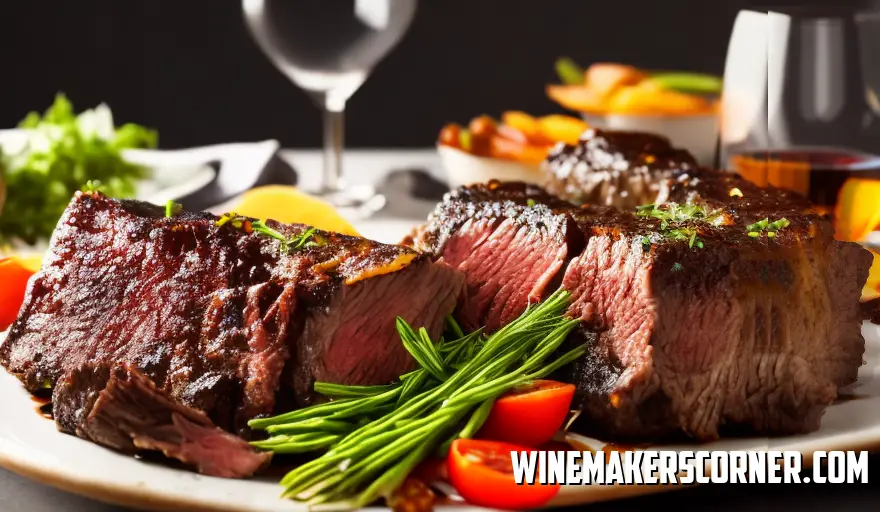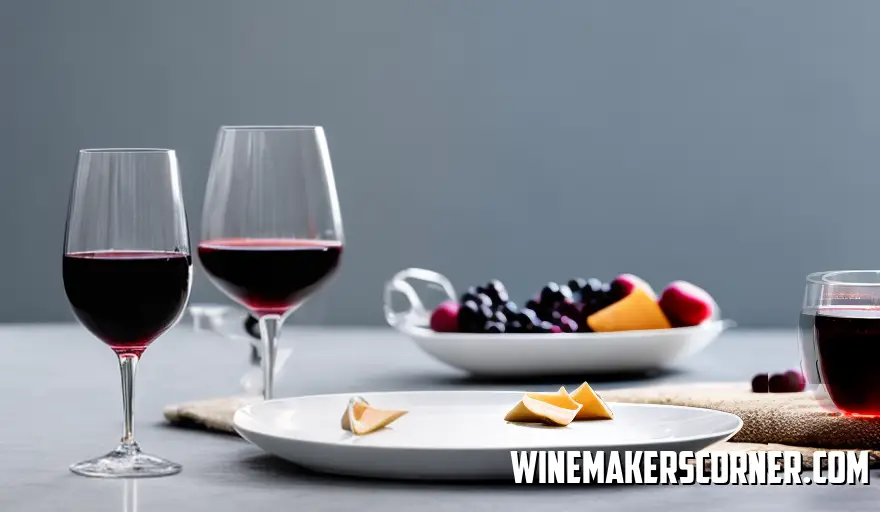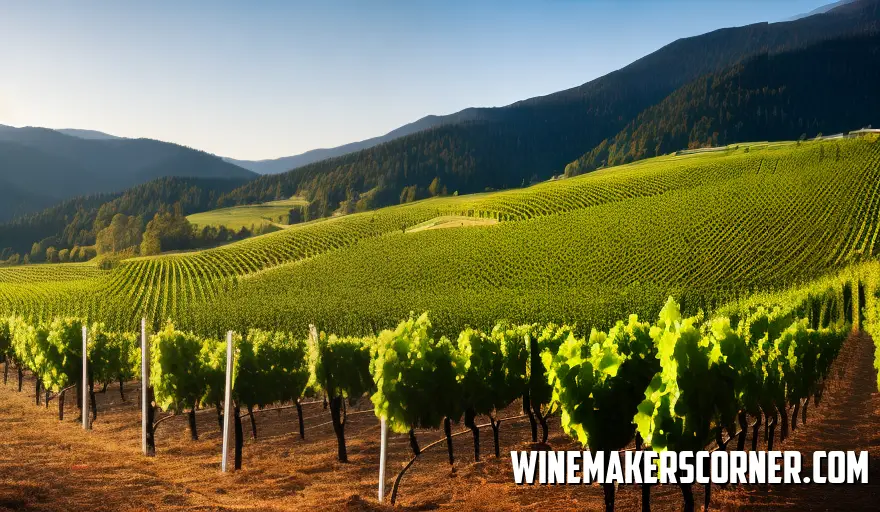Champagne is a sparkling wine that emanates sophistication and celebration. Its distinct effervescence and nuanced flavors are the results of meticulous fermentation processes, where yeast plays a pivotal role. In the realm of winemaking, champagne yeast is a collection of selected strains adept at conducting the secondary fermentation essential for producing those signature bubbles and complex taste profiles.
These specialized yeast strains are celebrated for their resilience and ability to ferment under the high-pressure conditions unique to champagne production. They are also chosen for their contribution to the wine’s aroma and flavor characteristics. The secondary fermentation typically takes place in the bottle, requiring a yeast that can perform in an anaerobic environment with limited nutrients while still generating the desired sensory attributes of premium champagne.
When considering the purchase of champagne yeast, the key factors to weigh include the yeast’s tolerance to alcohol and pressure, the temperature range of fermentation, and the impact on the wine’s final taste and aroma. Potential buyers should be aware that the choice of yeast will affect not only the quality of fermentation but also the nuanced flavors and textures of the finished champagne.
We’ve scrutinized various champagne yeast strains and their properties, ensuring that oenophiles and producers can make an informed decision tailored to their specific needs. The right yeast selection is essential for crafting a champagne that reflects the desired style, be it crisp and light or rich and complex. After thorough analysis and practical testing, we are equipped to guide you through the nuanced world of champagne yeast, ensuring your next bottle meets the highest standards of sparkle and sophistication.
Table of Contents
Top Champagne Yeast Selections
In our quest for the perfect fermentation, we recognize the vital role of selecting high-quality champagne yeast. Each product we’ve chosen for our roundup stands out for its reliable performance in producing exquisite, sparkling wines. Our focus is on yeasts that promise consistent fermentation, ensuring your homemade champagne has the ideal taste and effervescence. Whether you’re a homebrew hobbyist or a professional vintner, our curated list represents the best in the market to elevate your winemaking process.
Lalvin EC-1118 Wine Yeast
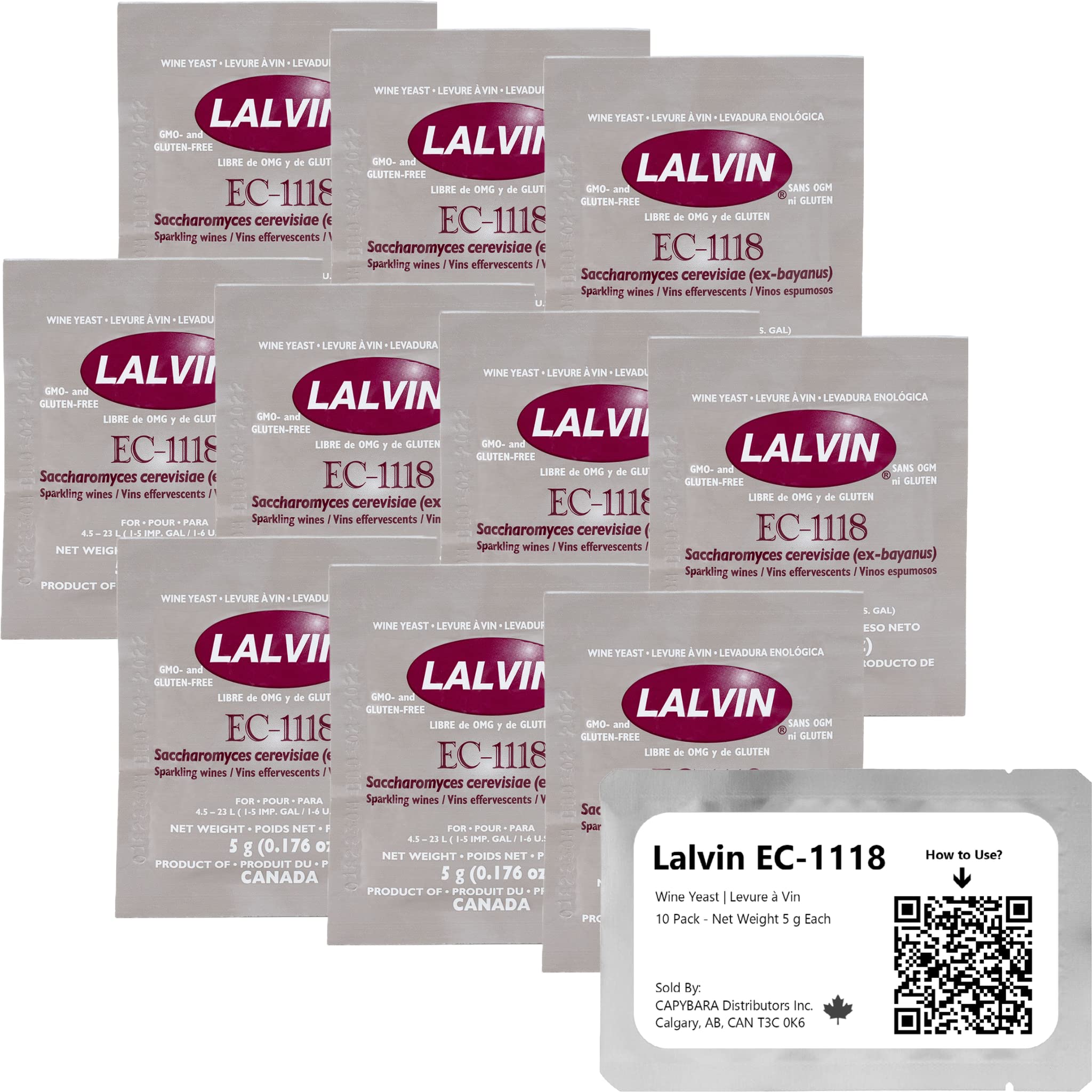
We’ve found that the Lalvin EC-1118 Wine Yeast provides a reliable and robust fermentation process for a wide variety of wines and ciders.
Pros
- Adapts well to different fermentables, producing a clean and crisp end product.
- High alcohol tolerance, capable of fermenting up to 18% ABV.
- Versatile use in not just wines but also meads, ciders, and even kombucha.
Cons
- May overtake subtle fruit flavors in more delicate wines.
- Requires proper rehydration to ensure a strong start and avoid slow fermentations.
- Some users report a slower start compared to other yeasts.
In our fermentations with Lalvin EC-1118 Wine Yeast, we’ve noted its hearty resilience across varying fermentation conditions. As we pitched the yeast into our latest batch of cider, the fermentation kicked off without a hitch, taking off quite vigorously after proper rehydration.
It’s particularly gratifying to see fermentation bubbles rising steadily, promising a robust end product, whether that’s a sparkling wine or a rich apple cider. This yeast isn’t just a workhorse; it’s a versatile addition to our fermentation toolkit, well-suited for a range of applications from wine to mead, and cider to kombucha, always delivering a consistent result.
Indeed, the yeast’s ability to forge ahead even in higher gravity musts assures us that we won’t encounter a stalled fermentation. Yet we do handle it with care, making sure it doesn’t overshadow the delicate notes of our specialty brews, as it can be a bit assertive for those. Overall, our experience with Lalvin EC-1118 has been largely positive, providing us the confidence to recommend it, especially to those looking for a reliable fermenter with high alcohol tolerance.
Red Star Premier Blanc
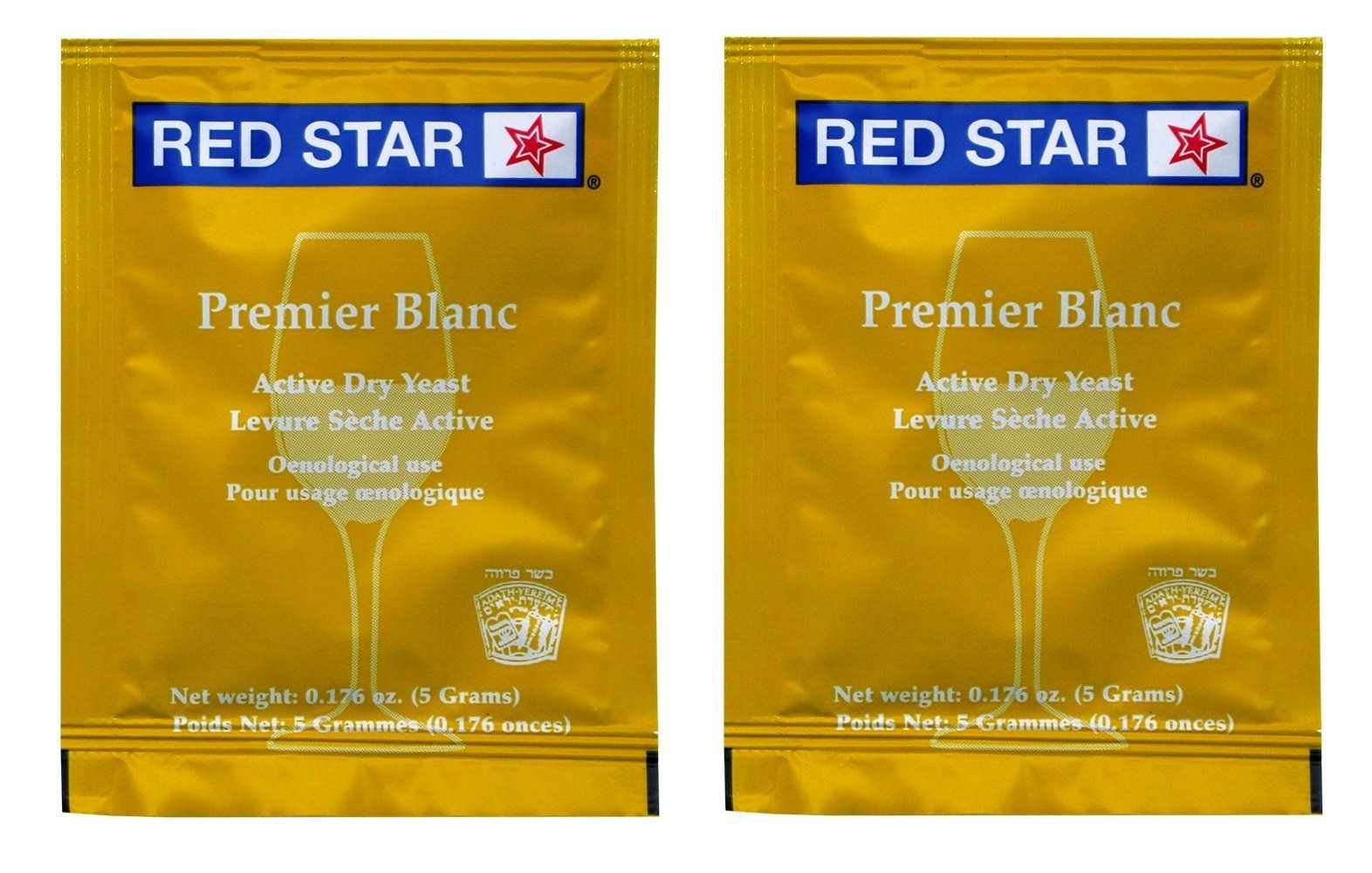
In our trials, the Red Star Premier Blanc Champagne Yeast packs a punch with its high tolerance and neutrality, suitable for both novices and seasoned winemakers.
Pros
- Ensures strong fermentation even in colder conditions
- Produces a clean taste, letting the fruit character shine
- Well-suited for a high alcohol content without stalling
Cons
- Could be too neutral for those seeking character from yeast
- May not be the best option for very delicate low-alcohol wines
- Two-pack may be limiting for larger batches; consider stocking up
Using Red Star Premier Blanc, our latest batch of sparkling wine showcased the yeast’s robustness—even in the cooler months, fermentation was vigorous and uninterrupted. Handling high sugar levels with ease, it produced a beautifully clear beverage with a reliable alcohol content, a testament to its touted high alcohol tolerance.
Our wine’s fruit flavors were front and center, thanks to the yeast’s neutral profile. It played its part without overpowering the natural tastes, which we found quite impressive for maintaining the authenticity of our chosen ingredients.
However, we noted that while neutrality is a strength, it could also be a limitation—it didn’t add any unique character to the wine, which some connoisseurs might prefer. Therefore, bear in mind the desired outcome for your wine before settling on this yeast.
During a recent experiment with a bigger batch, the two-pack format felt somewhat restrictive. So if you’re planning extensive winemaking, consider purchasing multiple packs to ensure consistent results across your entire production. Despite this, the Red Star Premier Blanc Champagne Yeast proved to be a reliable workhorse in our winemaking process, and we’d certainly use it again for our future fermentations.
Red Star Premier Blanc Yeast
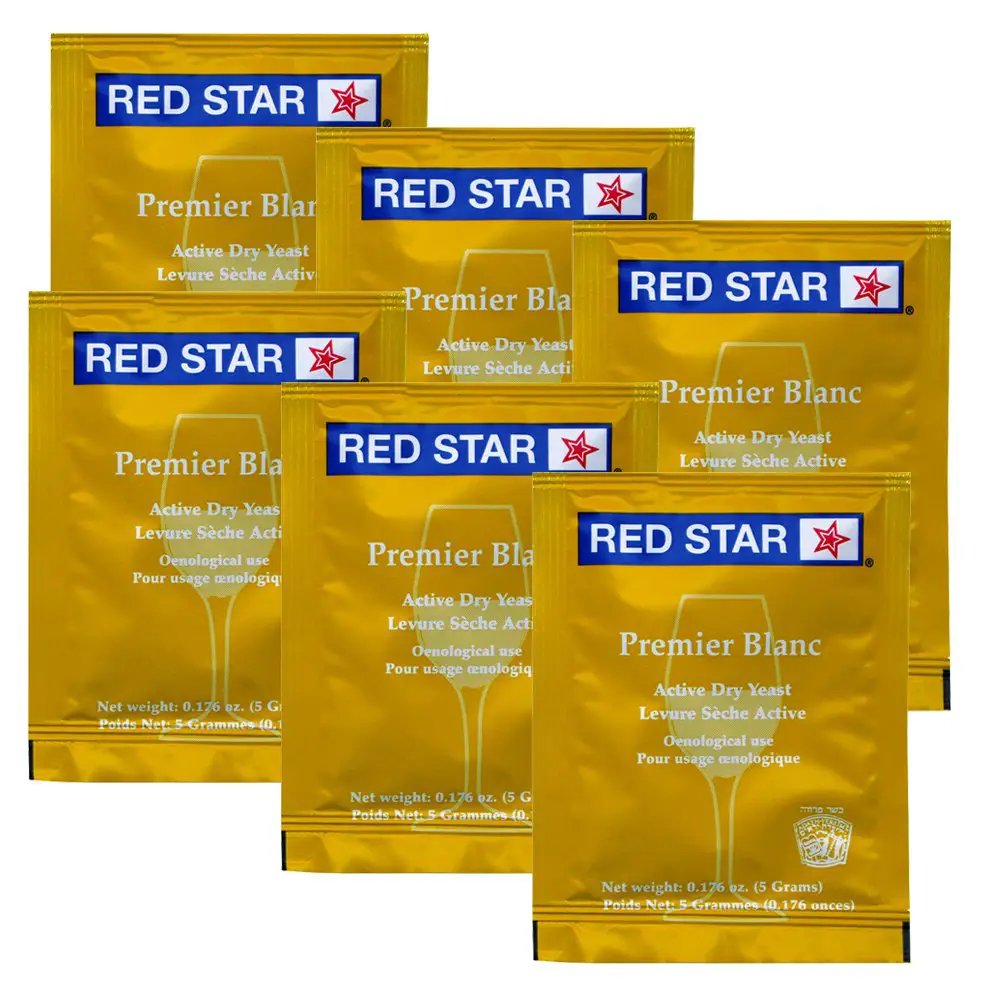
We definitely recommend the Red Star Premier Blanc Yeast for its robust fermentation and versatility with various fruit musts and juices.
Pros
- Efficiently ferments to dryness with a strong ethanol tolerance.
- Demonstrates versatility across white and some red wines, as well as fruit juices.
- Known to be effective for restarting stuck fermentations.
Cons
- Not the first choice for sparkling wine production.
- Can display limited flocculation, potentially creating clarity issues.
- May not be the most cost-effective option for large scale fermentations.
Having used Red Star Premier Blanc Yeast recently, we can attest to its vigorous fermentation capabilities. It’s reassuring to start a batch and see the yeast spring into action, even with challenging sugar levels. Its alcohol tolerance is impressive, meaning we’ve been able to achieve the desired dryness in our wines and ciders without unwelcome interruptions.
In our experience, this particular yeast is a workhorse across different fermentation scenarios. Whether we’re crafting a crisp chardonnay or trying our hand at fruit wines, the reliability of this strain remains consistent. Moreover, when we’ve had fermentations that stalled, a small addition of this yeast helped pick things right back up.
Despite its many strengths, we don’t suggest going for this yeast if your end goal is a sparkling wine. The flocculation isn’t quite up to par for that style, and clarity in the final product may need additional help from fining agents. If you’re planning a large batch, consider the cost per pack, as it might add up. But all things considered, Red Star Premier Blanc Yeast is a solid choice, delivering powerful fermentation and adaptability under a variety of conditions.
Premier Blanc Wine Yeast
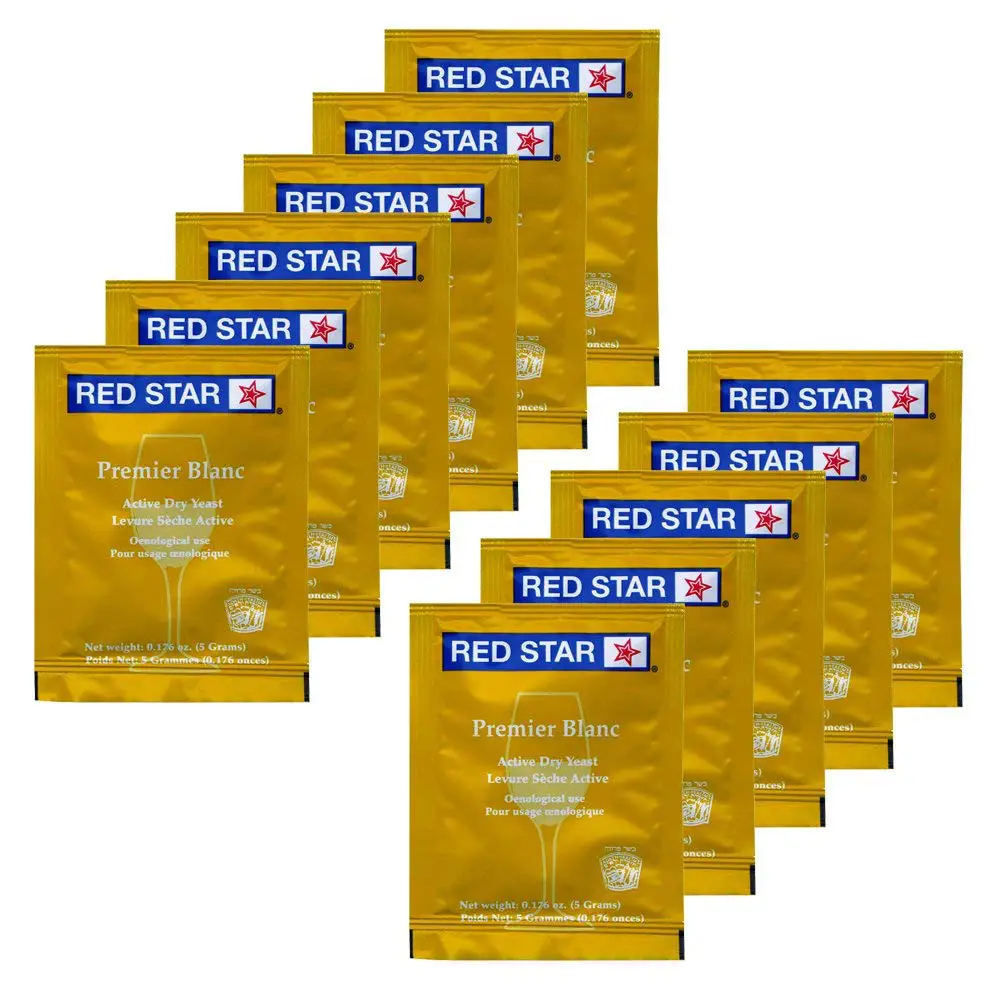
We recommend this for both novice and experienced fermenters due to its reliability and wide range of uses.
Pros
- Enhances the flavor profile of wines and ciders beautifully
- Exhibits vigorous and consistent fermentation
- Packaging provides ample yeast for multiple batches
Cons
- May sometimes clump if not rehydrated properly
- Takes a bit of experience to find the perfect balance for certain brews
- Not optimized for all wine styles as claimed
In our latest batch, we noticed that the Premier Blanc Wine Yeast from Midwest Homebrewing brims with versatility, imparting delightful nuances to the cabernet we crafted. Its dependable fermentation process left us with a smooth and palatable dry white that our friends raved about.
During another fermentation trial, the yeast proved to be a champ at kickstarting the fermentation, displaying an impressive work rate. Our cider yielded that crisp and refreshing taste, highlighting the yeast’s quality. If we had a dollar for every compliment we received on the cider’s flavor, we’d be buying rounds for the whole bar!
This isn’t our first rodeo with yeasts, but this one is a keeper for our home-brewing exploits. We’ve learned that with a slight learning curve, even a mead can be bubbly and boast a higher ABV, thanks to the Premier Blanc’s potent nature. It’s not only about how well it ferments; the final product’s flavor is significantly richer when compared to those made with basic yeasts.
Red Star Premier Blanc
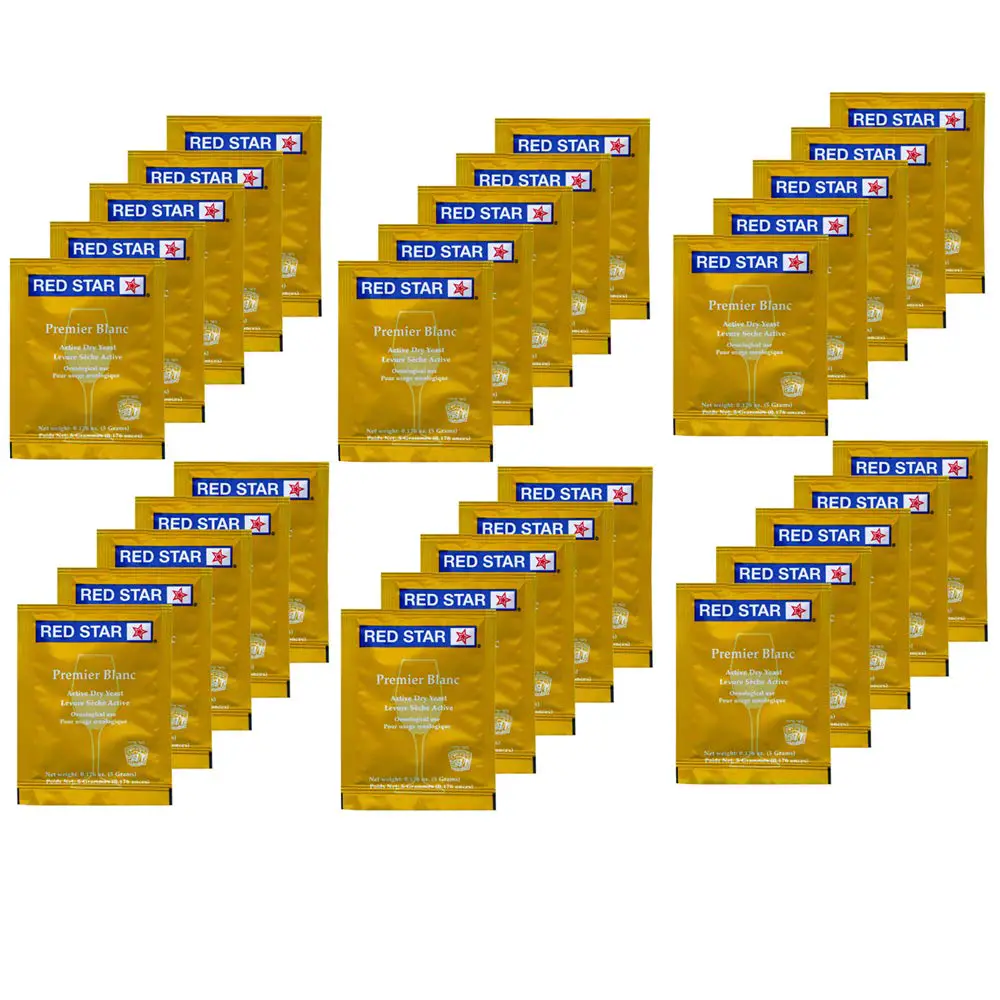
After our latest batch, we’re convinced this yeast is a solid choice for any fermentation enthusiast looking for reliability and performance.
Pros
- Prolific fermenter with excellent alcohol tolerance
- Versatile for white wines, select reds, and fruit juices
- Good resistance to sulfur dioxide, ensuring a steady ferment
Cons
- Occasionally, a packet may contain inactive yeast
- Small print on packaging can be challenging to read
- Packaging size may be insufficient for large scale projects
The Red Star Premier Blanc Champagne Yeast delivered impressive results when we fermented our latest batch of Chardonnay. It kicked off fermentation swiftly and reached completion without a hiccup. This is a testament to how well it can prevent or resolve sluggish fermentation, which is a common headache in winemaking.
From our experience, the ethanol tolerance of this yeast is commendable. It handled our high-sugar must with ease, which often poses a challenge for lesser strains. Moreover, this versatility isn’t limited to wines; we’ve succeeded in creating a delightful sparkling apple cider, thanks to its robust fermentation capabilities.
Despite the overall success, we did encounter a rare issue with a packet that seemed to have lost its potency, but this didn’t overshadow the positive outcomes. The small type on the packets may cause some squinting, so be prepared with your reading glasses. If you’re looking to ferment in larger quantities, consider the fact that you may need to purchase multiple packs, as they come in a standard 10-count bundle.
Overall, the Red Star Premier Blanc Champagne Yeast is a dependable choice for both amateur and experienced fermenters. With its high alcohol tolerance and adaptability to different fermentables, it’s a valuable ally in the quest for exquisite homemade beverages. Just be mindful of the rare possibility of inactive yeast and the small packaging, especially for larger endeavors.
Buying Guide
Understanding Yeast Strains
Choosing the best champagne yeast involves considering several features. We prioritize the yeast’s ability to ferment under the unique conditions required for making high-quality champagne.
- Tolerance to Alcohol: Look for high alcohol tolerance to ensure proper fermentation.
- Temperature Range: Ideal yeasts work well within the specific temperature range of traditional champagne-making regions.
- Flocculation: Opt for strains with suitable flocculation characteristics to achieve clarity without extensive filtration.
Desired Flavor Profile
Our selection should align with the target flavor profile of the final champagne product.
- Ester Production: We prefer yeasts that contribute to desired ester profiles, impacting the champagne’s fruitiness and aroma.
- Sulfur Compound Management: Yeasts that minimize sulfur compounds are ideal to avoid off-flavors.
Compatibility with Production
The yeast must be well-suited to our champagne production method.
- Nutrient Requirements: We examine nutrient needs to ensure compatibility with grape must composition.
- Growth Rate: A consistent, predictable growth rate is key to anticipated fermentation durations.
Assessing Quality
Consistency and viability of yeast are paramount in our selection.
- Viability: Fresh or properly stored yeast ensures high viability.
- Purity: We ensure yeast is free from contaminants for a clean fermentation process.
Packaging and Storage
Proper packaging and storage instructions are crucial for maintaining yeast quality.
| Criteria | Importance |
|---|---|
| Packaging Integrity | Critical |
| Expiration Date | Highly Important |
| Storage Conditions | Highly Important |
We adhere to these criteria to procure the best possible champagne yeast for our production needs.
